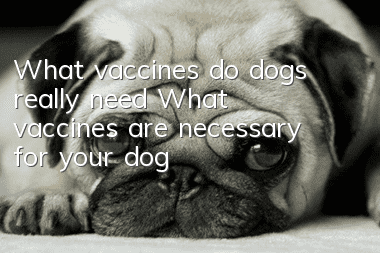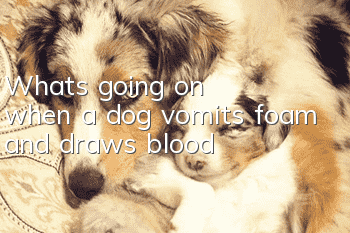What vaccines do dogs really need? What vaccines are necessary for your dog?

Basically all drugs have a certain degree of weak toxicity, so we have always emphasized that vaccination of dogs should be carried out when the dog is in good health. Of course, we must also note that due to individual differences in dogs and the method of vaccination, it may cause certain adverse phenomena in dogs. So what vaccines do dogs really need? What kind of vaccines are necessary for your dog?
Are vaccines safe?
Most vaccines Response rates are low and there are problems that can be life-threatening to your pet. So it’s best to only vaccinate your dog with the vaccines he really needs, and I don’t believe in over-vaccination.
What vaccines do dogs really need?
It depends on the age of the dog and how dangerous the vaccine is.
Puppies should start receiving a full set of vaccinations at 6-8 weeks, and repeat every 3-4 weeks until 16-20 weeks. This vaccination method can effectively protect them against All common diseases.
Adult dogs that have not been vaccinated should also receive at least two sets of vaccines, and they should be vaccinated every 3-4 weeks. Adult dogs should be vaccinated with necessary vaccines (such as rabies vaccine) and other vaccines in accordance with legal regulations, at least once every three years.
Vaccine recommendations
1. Puppies:
Puppies can be obtained through breast milk Immunity to certain diseases, but this immunity wears off within the first few months of a puppy's life. To protect puppies during this critical period, researchers used a scientifically proven method: giving puppies a series of vaccines every 3-4 weeks until they have a high level of resistance to infectious diseases. The typical vaccine is a "combination" vaccine that protects against: canine distemper virus, canine adenovirus, parainfluenza virus, and canine parvovirus (these four viruses are often abbreviated as DHPP)
Many veterinarians also It is recommended that leptospirosis vaccines be included in the vaccine series (these five viruses are often abbreviated as DHLPP). In the United States, relevant laws stipulate that dogs should be vaccinated against rabies between 16 and 26 weeks of age.
2. Dogs between 20 weeks and 2 years old:
Among young dogs, it is recommended by veterinarians to give them booster vaccinations. to ensure they have adequate lifelong immunity against deadly viral diseases. Your veterinarian may give your dog "booster" vaccines to better protect him against: canine distemper virus, canine adenovirus, parainfluenza virus, canine parvovirus, and leptospirosis virus.
Many dogs will have strong resistance to certain bacterial diseases in the early stage after vaccination (such as whooping coughbacilli and leptospirosis). However, immunity against these diseases usually does not last more than a year, and for this reason, I recommend giving your dog an annual (or more frequent) booster vaccine.
"Pertussis vaccine" can prevent "dog cough", which is a vaccine that most kennels will definitely vaccinate dogs. This is also a vaccine that dogs must receive before participating in certain recreational activities or competitions.
There is currently a vaccine against the canine influenza virus. The vaccine is recommended for "potentially at-risk" dogs, which include dogs that are in frequent contact with other dogs, participate in activities with other dogs, or are housed with other dogs. These dogs can obtain sufficient immunity from the influenza virus from the vaccine.
Rabies vaccine is a vaccine that is required by law. In addition, in some areas, leptospirosis vaccination is also compulsory.
3. Adult dogs (over 2 years old):
It is recommended to conduct annual revaccination (booster) in the first year after the "puppy vaccine" type vaccine), you should then discuss the benefits and risks of annual vaccinations with your veterinarian.
In the past, DHLP (canine distemper virus, canine adenovirus, leptospirosis, parvovirus) vaccine was usually administered once a year. However, vaccination protocols are changing. The American Animal Hospital Association (AAHA) proposed new guidelines in 2006 recommending that a booster vaccine every 3 years is sufficient for adult dogs.
You should implement the most appropriate vaccination program for your pet
I have to say the important thing again: if your dog has a larger If you are at risk of developing a cough or flu virus, then I strongly recommend that you vaccinate your dog with the Pertussis pertussis vaccine and the canine influenza vaccine. Both vaccines require two doses initially, then once a year. However, it’s best to have your veterinarian evaluate whether both vaccines are necessary for your dog.
As mentioned above, rabies vaccine is a vaccine that is required by law. In addition, in some areas, leptospirosis vaccination is also compulsory.
The need for vaccines should be determined based on the country your dog lives in and his lifestyle. If you want to vaccinate, you should vaccinate 1-2 times a year.
Other vaccines include: coronavirus vaccine, Lyme disease vaccine and giardiasis vaccine. These are not routine vaccines and their administration should be discussed with your veterinarian. The American Animal Hospital Association (AAHA) issued new guidelines in 2006 recommending that dogs of any age not be vaccinated against coronavirus and giardia and recommending that dogs living in tick-endemic areas be vaccinated against borreliosis Or Lyme disease vaccine.
Another option for deciding what vaccines your dog needs is: taking your dog toDo a vaccine assessment.
If your adult dog has an adverse reaction to the vaccine (such as fever, vomiting, shaking, or facial swelling), then you need to take the dog for a vaccine evaluation and discuss it with your veterinarian Risks of annual revaccination.
Do you need a vaccine evaluation for your dog?
A vaccine evaluation is a blood test that can be used to determine the number of antibodies that have developed in response to the vaccine. exist. Because different amounts of antibodies can be detected in different animals, the results of vaccine evaluations are expressed as ratios. A higher than standard vaccine ratio may indicate that the pet does not need a booster vaccine at that time. The low rate results indicate that pets currently need to be vaccinated to provide adequate immune protection. A "vaccine assessment" is a method used to determine whether a dog needs vaccinations.
However, the cost of vaccine evaluation is much higher than vaccination, so most pet owners will not choose to take their dogs for this test.
How do I vaccinate my dog?
1. For puppies, I recommend giving them a complete vaccine series initially (e.g. DHPP vaccine), and a booster vaccine when they are one year old, and then giving them rabies vaccinations as required by law (once a year or every 3 years) Once a year, depending on the laws of each region).
2. For unvaccinated adult dogs, they should receive two sets of vaccines every 3-4 weeks, including: pertussis vaccine and canine influenza vaccine, and then be vaccinated against rabies as required according to local laws. vaccine.
3. For adult dogs that were vaccinated as puppies, they will need to be vaccinated every three years. They have annual checkups and blood tests after age 7 (this has nothing to do with vaccinations, but is a test that can be used to assess their overall health). Then according to local laws and regulations, get rabies vaccination as required.
4. For middle-aged dogs in good health (large breeds over 7 years old or small breeds over 10 years old), they should receive booster vaccinations every 3 years, followed by annual physical examinations and blood tests. They are then vaccinated against rabies as required by law (annually or every 3 years, depending on the laws of each region).
5. For older dogs who are sick and taking medications, I honestly would not recommend giving them any other vaccinations other than rabies (which is required by law). In addition, they should receive exams and blood tests twice a year (and more or more frequently if necessary).
- How to cut your pet's nails
- What to do if your dog’s milk is engorged
- How to solve constipation in puppies
- What are the common methods for training dogs? Teach you how to communicate and train with your dog!
- How to Treat Ear Canal Infections in Silver Fox Dogs
- General treatments for dog poisoning
- Apply iodophor for fungal skin disease in dogs
- The importance of deworming pets
- What does it mean when a dog wags its tail and barks?
- How to train a two-month-old puppy?



